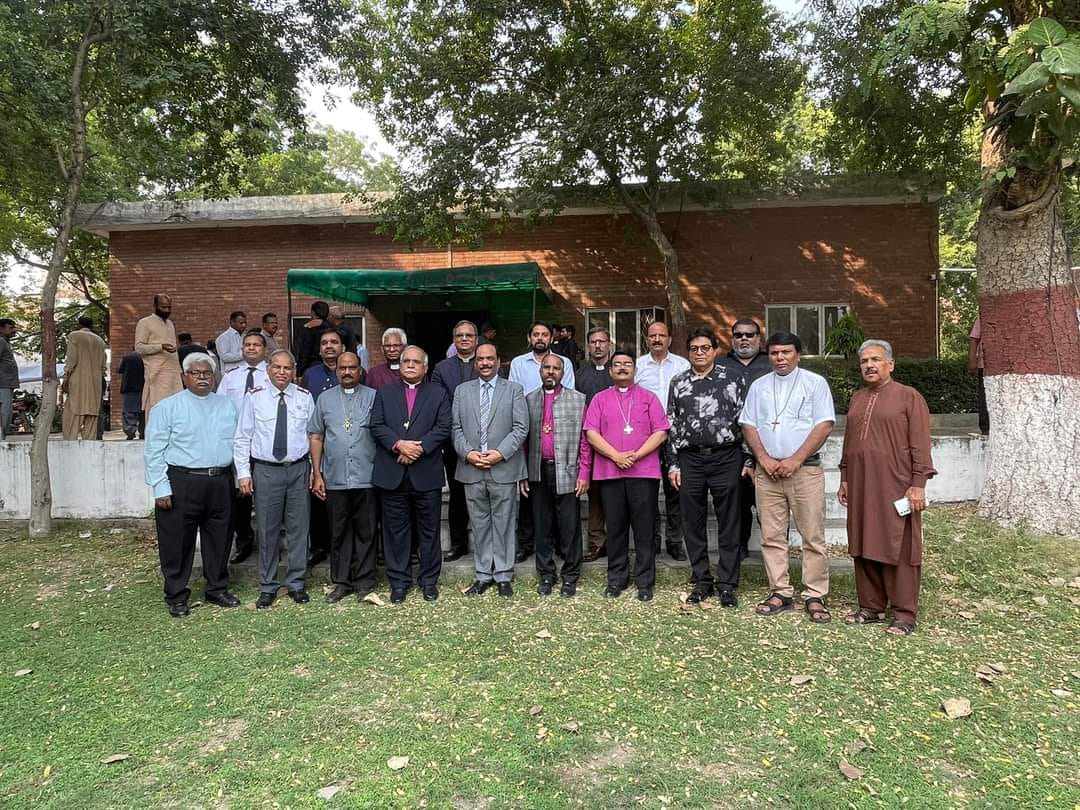News Desk
Lahore, 3rd October 2024:
The National Council of Churches in Pakistan (NCCP) held its General Committee meeting on Thursday, presided over by The Most Rev. Dr. Azad Marshall, Moderator/President Bishop of the Church of Pakistan. The meeting, which gathered representatives from various member denominations, focused on electing new leadership and reviewing past activities.
Delegates from the Presbyterian Church of Pakistan (PCP), the Church of Pakistan, The Salvation Army, and the Associated Reformed Presbyterian Churches (ARP) attended the session.
Rev. Dr. Majid Abel, the Interim Executive Secretary, presented the minutes of the previous Executive Committee meeting, held on 27th July 2024 at 8-Empress Road, which were approved unanimously.
A key highlight of the meeting was the formation of a Nomination Committee, led by Bishop Leo Roderick Paul, to propose new leadership candidates. After due consideration, the committee presented its recommendations, which were unanimously endorsed by the General Committee.
The newly elected NCCP officers are as follows:
The Rt. Rev. Alwin John Samuel – President
Rev. Dr. Majid Abel – Executive Secretary
Col. Macdonald Chandi and Rev. Arif Siraj – Vice Presidents
Rev. Kashif Naveed (ARP) – Treasurer
In recognition of his contributions and long-standing service, The Most Rev. Dr. Azad Marshall was named President Emeritus of the NCCP.
However, the transition was not without contention. Former Executive Secretary Victor Azariah talking to White Post, expressed serious reservations regarding the recent appointments within the organization. Azariah, claimed that the appointment of his successor and other key officials had been carried out unconstitutionally.
“The appointments have not followed the proper constitutional procedures,” Azariah stated. “During my tenure, I repeatedly urged the authorities to appoint a new, competent Executive Secretary by consulting all stakeholders and adhering to a transparent and constitutional process.”
At 93 years old, Azariah emphasized that his concerns were not born of personal interest, as he had long desired to step down due to his age. “I have served the NCCP for many years, achieving significant milestones, and I no longer seek any position. My only concern is that the new leadership appointments should have been made following the proper constitutional framework, with the involvement of all relevant stakeholders,” he added.
In response, the newly appointed Executive Secretary of the NCCP, Rev. Majeed Able, defended the legitimacy of the recent appointments. “These appointments were made in the presence of four key stakeholders: the Presbyterian Church of Pakistan (PCP), the Church of Pakistan, The Salvation Army, and the Associated Reformed Presbyterian Churches (ARP). These institutions are the main pillars of the NCCP, and their involvement proves that the process was both legal and constitutional,” Rev. Able explained.
The changes in leadership, also include the appointment of Rev. Bishop Alwin Samuel as new President of the NCCP. In a statement issued after holding the main position, Bishop Samuel cited the renowned Swiss theologian Karl Barth, reflecting on the deeper responsibilities of Christian life.
“Barth once asked, ‘What makes a Christian a Christian?’ and his answer was clear: it is not found in personal well-being but in fulfilling the tasks to which we are called. We are called to live in obedience to God and serve our fellow believers and humanity,” Bishop Samuel remarked. “Let us remain united in our service and faithful to our calling.”
The leadership transition has drawn mixed reactions from within the NCCP’s General and Executive Committees, with questions lingering about whether the appointments truly reflect the collective will of the Council’s stakeholders.
As the NCCP moves forward under its new leadership, the organization faces the challenge of navigating these concerns while continuing to focus on its mission of serving Christian communities across Pakistan.


